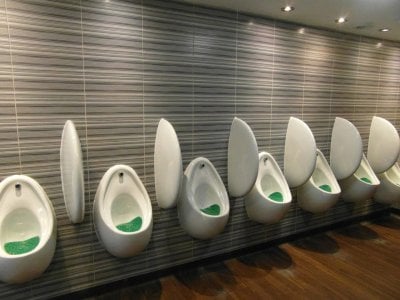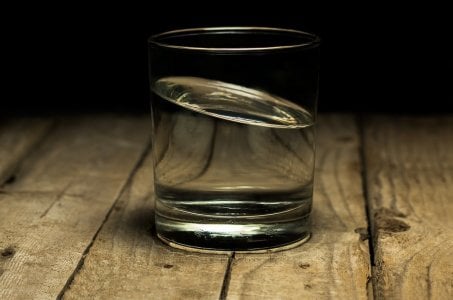Are you tired of nighttime bathroom breaks? A urologist reveals how to stop them!
A leading urologist has shared tips for men to stop the need to urinate during the night.
Over 30 million men above 50 years old worldwide find their rest interrupted at least once nightly due to a medical condition known as nocturia (a medical term that refers to the condition of waking up during the night to urinate).
Dr Edward (Ted) Schaeffer of Northwestern University in Chicago, Illinois, said the disturbance was being driven by the normal age-related enlargement of the prostate as it exerts pressure on the bladder.
To achieve a full night's sleep without interruptions, Dr Schaeffer offers three practical tips.
On the Peter Attia Drive Podcast, Dr Schaeffer shared: ‘You can go from [urinating] two times at night to one time at night just by changing what you drink and wearing tight stockings.’
‘It may not [be] true for everybody, but it certainly encourages people to do simple things without doing polypharmacy.’
Tip 1: No water right before bedtime
Dr Schaeffer encouraged men not to drink water before bed.
He pointed out: ‘A lot of people come in with night-time urinary frequency and a lot of that you can just modify with education.’
‘So, by saying, “Hey, don't have a glass of water right before you go to bed.”’
‘And, “If you wake up during the night to use the loo, avoid having another glass of water straight after” — that can help.’
Drinking water just before bed increases the amount of fluid in the bloodstream, which is then rapidly filtered out by the kidneys.
This results in fluid buildup in the bladder, making a toilet within a few hours almost inevitable.
Younger men can counteract this because they have higher concentrations of the anti-urine production hormone ADH (Antidiuretic hormone), and have more elastic bladders.
However, older men, particularly those over 50, have reduced levels of ADH and less elastic bladders.
Tip 2: Wear knee-high stockings
Dr Schaeffer also advised men with any signs of fluid retention in their legs to wear knee-high stockings to bed.
Wearing high-knee socks can be a telltale sign of edema if you observe noticeable swelling in your feet and ankles once the socks are removed.
When wearing high-knee socks, noticeable indentations on the skin can indicate edema.
Additionally, signs like stretched, shiny skin beneath the socks, tightness or pain, and colour variations between covered and exposed areas can also be indicative.
The most evident sign would be ‘pitting edema,’, which can be observed when the skin, after being pressed for 10 seconds beneath the sock, leaves a dent.
Obese or overweight individuals are more prone to fluid retention, increasing their risk of edema, which can cause swelling in the feet or a feeling of tightness around the socks due to excess bodily fluid.
Dr Schaeffer said: ‘One of the behavioural modifications is knee high stockings for people who if I see them at 8, 9, 10 o'clock and they have any edema... then I definitely strongly encourage them to do that.
‘I tell people that if you're getting up twice a night and you have a little bit of edema, we do have some behavioural modifications and we can reduce your nocturnal urinary frequency.’
Fluid retention between body cells is indicated by edema (a medical term for swelling caused by an excess fluid buildup in the body's tissues).
When someone goes to bed, doctors explain that this fluid can flow back into the bloodstream and be filtered into the bladder by the kidneys, causing them to urinate.
Tip 3: Avoid beer before bed
Dr Schaeffer also warned people to avoid alcohol before bedtime, especially beer.
Dr Schaeffer explained that beer’s high fluid content meant it would quickly cause the bladder to fill, while the alcohol it contains suppresses the anti-urine production hormone.
Dr Peter Attia added: ‘Alcohol, by the way, inhibits this hormone which is why alcohol before bed is a great recipe for having to get up and pee.’
‘You get the fluid in the drink and then you get a molecule that inhibits the release of the anti-diuretic hormone.’
Why do older men have bladder problems?
Dr Schaeffer noted that nearly every man will either experience urinary issues themselves or know someone who does.
This is linked to the male body's architecture behind urination and changes in the body that happen as men grow old.
The urethra—or tube that carries urine and semen out of the body—runs directly through the middle of the prostate.
However, the prostate gradually expands in men as they age.
Prostate health: common problems, cancer prevention, screening, treatment, and more. Video source: Social media – YouTube (@PeterAttiaMD)

Members, what do you think of Dr Schaeffer's tips? Will you try these suggestions for better sleep? Share your thoughts in the comments below!
Over 30 million men above 50 years old worldwide find their rest interrupted at least once nightly due to a medical condition known as nocturia (a medical term that refers to the condition of waking up during the night to urinate).
Dr Edward (Ted) Schaeffer of Northwestern University in Chicago, Illinois, said the disturbance was being driven by the normal age-related enlargement of the prostate as it exerts pressure on the bladder.
To achieve a full night's sleep without interruptions, Dr Schaeffer offers three practical tips.
On the Peter Attia Drive Podcast, Dr Schaeffer shared: ‘You can go from [urinating] two times at night to one time at night just by changing what you drink and wearing tight stockings.’
‘It may not [be] true for everybody, but it certainly encourages people to do simple things without doing polypharmacy.’
Tip 1: No water right before bedtime
Dr Schaeffer encouraged men not to drink water before bed.
He pointed out: ‘A lot of people come in with night-time urinary frequency and a lot of that you can just modify with education.’
‘So, by saying, “Hey, don't have a glass of water right before you go to bed.”’
‘And, “If you wake up during the night to use the loo, avoid having another glass of water straight after” — that can help.’
Drinking water just before bed increases the amount of fluid in the bloodstream, which is then rapidly filtered out by the kidneys.
This results in fluid buildup in the bladder, making a toilet within a few hours almost inevitable.
Younger men can counteract this because they have higher concentrations of the anti-urine production hormone ADH (Antidiuretic hormone), and have more elastic bladders.
However, older men, particularly those over 50, have reduced levels of ADH and less elastic bladders.
Tip 2: Wear knee-high stockings
Dr Schaeffer also advised men with any signs of fluid retention in their legs to wear knee-high stockings to bed.
Wearing high-knee socks can be a telltale sign of edema if you observe noticeable swelling in your feet and ankles once the socks are removed.
When wearing high-knee socks, noticeable indentations on the skin can indicate edema.
Additionally, signs like stretched, shiny skin beneath the socks, tightness or pain, and colour variations between covered and exposed areas can also be indicative.
The most evident sign would be ‘pitting edema,’, which can be observed when the skin, after being pressed for 10 seconds beneath the sock, leaves a dent.
Obese or overweight individuals are more prone to fluid retention, increasing their risk of edema, which can cause swelling in the feet or a feeling of tightness around the socks due to excess bodily fluid.
Dr Schaeffer said: ‘One of the behavioural modifications is knee high stockings for people who if I see them at 8, 9, 10 o'clock and they have any edema... then I definitely strongly encourage them to do that.
‘I tell people that if you're getting up twice a night and you have a little bit of edema, we do have some behavioural modifications and we can reduce your nocturnal urinary frequency.’
Fluid retention between body cells is indicated by edema (a medical term for swelling caused by an excess fluid buildup in the body's tissues).
When someone goes to bed, doctors explain that this fluid can flow back into the bloodstream and be filtered into the bladder by the kidneys, causing them to urinate.
Tip 3: Avoid beer before bed
Dr Schaeffer also warned people to avoid alcohol before bedtime, especially beer.
Dr Schaeffer explained that beer’s high fluid content meant it would quickly cause the bladder to fill, while the alcohol it contains suppresses the anti-urine production hormone.
Dr Peter Attia added: ‘Alcohol, by the way, inhibits this hormone which is why alcohol before bed is a great recipe for having to get up and pee.’
‘You get the fluid in the drink and then you get a molecule that inhibits the release of the anti-diuretic hormone.’
Why do older men have bladder problems?
Dr Schaeffer noted that nearly every man will either experience urinary issues themselves or know someone who does.
This is linked to the male body's architecture behind urination and changes in the body that happen as men grow old.
The urethra—or tube that carries urine and semen out of the body—runs directly through the middle of the prostate.
However, the prostate gradually expands in men as they age.
Prostate health: common problems, cancer prevention, screening, treatment, and more. Video source: Social media – YouTube (@PeterAttiaMD)
Key Takeaways
- Dr Edward Schaeffer, a leading urologist, has offered advice on how to stop nighttime urination, a condition affecting more than 30 million men aged over 50.
- His tips include not drinking water before bed, avoiding alcohol, and wearing knee-high stockings to reduce fluid retention.
- Dr Schaeffer explains that nighttime urination is often the result of an enlarged prostate, which puts pressure on the bladder.
- He cites a decline in the hormone ADH and less elastic bladders as age-related factors contributing to increased urination frequency at night in older men.










